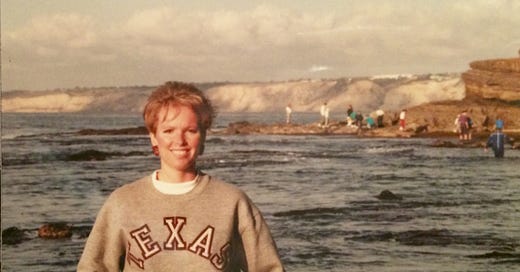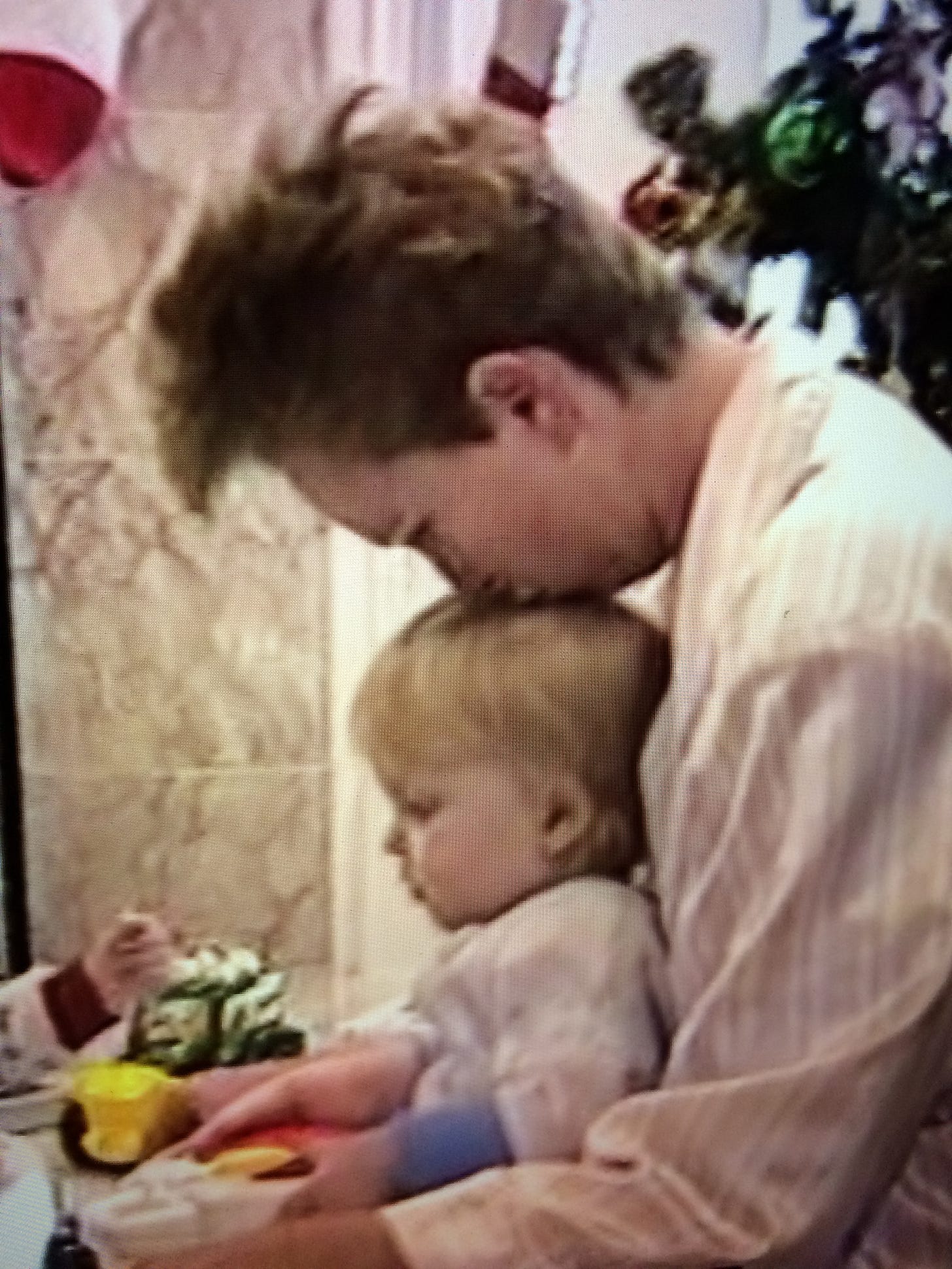Some days you find out that your dead mom did cocaine.
You’re sitting around the fire, watching smoke swirl into the darkening sky as you ask your dad how he and mom spent their twenties in the big city. You know the rough outlines of their years before you, but you want color, details.
Growing up, you saw your parents though the lenses of a kindergartener who believes her teachers live at school—you sure do love ‘em, but they only exist where you can see them, where you can touch them. What could they possibly get up to without you around, anyways?
But now you are 29, and you are wondering what the people who raised you might have been doing as their own roaring twenties waned.
As it turns out, they—or at least your dead mom—got up to a little more than you thought.
You are a goody-two-shoes raised by a woman you thought was a fellow two-shoer. A Sunday school volunteer. A preschool teacher.
But then your dad drops this piece of intel, casually, like someone giving you the time—not the tone of someone whose statement has violently blown your dead mom’s good shoes to smithereens.
It was the 80s, he says. She was mixed up with the wrong crowd. Lots of people tried cocaine.
This may be so.
Did you try cocaine? I ask him.
I was going to church, he replies.
You consider all you could’ve done with this information growing up—think of the bargaining! You’re mad that I missed curfew for the second time ever? You did cocaine!
Maybe she didn’t tell you for a reason.
You never think to ask your mom about cocaine until it’s too late.
How did you get mixed up with the wrong crowd? What were you looking for? What did you find? How did you get un-mixed? What actually satisfies? How did you become the woman I knew, love, and try so hard to be like?
You were only a teenager when doctors gave her six months to live. You didn’t think—couldn’t have thought—to use that time to ask her about the deeper things of life. You weren’t sure what the deeper things of life were. (And worst of all, if she tried to tell you anything too serious, you probably wouldn’t have listened.)
A 16-year-old is locked in on the immediacy of now—of driving to Starbucks with friends to scheme out how to get asked to the homecoming dance. A teenager is meant to laugh and loiter and take the SAT and not consider what regrets may bubble up over a decade in the future. Your undeveloped prefrontal cortex doesn’t have it in her to interview your mom about life and loss and love before she dies. Teenage you has Taylor Swift for that.
Miraculously, mercifully, your mom beat the odds—but not by much. She was there to see you turn 18, to ace the SAT, and to not get asked to the homecoming dance one final time (you can’t have it all). Then, a few months later, she is gone.
Of course you knew her absence would ache, that there’d be a thousand things to miss. But you didn’t think—couldn’t have thought—how much you’d long for her wisdom as you realized the limits of your own.
Now that it is too late, now that you are an “adult,” the questions creep up with each new milestone.
How did you know Dad was The One?
How did you know you were ready to have kids?
How did you know what to do with those kids once you had them?
You hate that even though she’s still the top “Favorite” on your phone, you’ll never call her again.
There are so many things you wish you could ask your dead mom.
It’s nearly enough to make you write a daily letter, to start a daily video diary for your own daughter. There are questions your baby doesn’t know to ask! (Mainly because she is not yet two years old.) But there are things you feel you must tell her, lessons you must leave her.
Here are all the times I did cocaine or other drugs: none. Be like me, please.
Here’s how you know he’s The One: you don’t. There is no One. You just choose and then choose to keep choosing him. This is much easier when you both love God.
Here’s how you know you’re ready to have kids: you have sex. Don’t have sex if you’re not ready for that outcome. This is much easier when you both love God and are married.
Here’s what I need you to know: being your mom has brought me more joy, more wonder, more love than I know what to do with. It is so, so good that you exist.
If I die before you get to hear all my mistakes, know that I made plenty. A lot of their roots come from missing this truth: we come into this world thirsty, but there is only one well of living water.
I wish I could always be here to answer all your questions. I think I know a lot.
But what I know deepest of all is what my at-least-one-time-cocaine-user mom sang to me and I sing to you: that yes, Jesus loves me.
On the day you find out that your dead mom did cocaine, you might start to wonder why, despite knowing that her end was near, she did not try to leave you a magnum opus explaining everything she ever learned and wanted you to know. You were only a teenager. Surely she knew you’d grow to have questions, that you’d make avoidable mistakes.
You will lay in bed that night, staring into the dark, bursting with questions you can’t voice. Later, you’ll consider that
maybe—
beautifully, selflessly—
your dying mother just wanted to let you be a kid.
Maybe, instead of absorbing a lecture on the meaning of life, she simply wanted you to enjoy being silly at Starbucks.
She knew things were heavy. Maybe she chose to hold her breath in order to let you breathe.
Maybe the bravest thing she did was trust that someone else was holding you, and would keep holding you even after she was gone.
And maybe she knew, or just stubbornly hoped, that you’d learn all the lessons eventually. Not through letters left from beyond the grave, but through what she wove within you, as she showed up every morning—for 18 years, 4 months, and 24 days—with beautiful, selfless love.






wow this is raw and real. appreciate you sharing and the time it must have taken to shape the way you told this personal story.
Thank you for sharing this piece of your family's story: it's beautiful and evocatively written, like scenes from a sepia-toned vignette.
I am adopted. My birth mom is still alive and well, and I'm grateful to have a loving relationship with her - but she lives millions and millions of miles away across the Pacific. And for all the technological advances in the world - for which I am grateful! - nothing replaces the immediacy and tangibility of embodiment. Jesus certainly knew that. (Note: I love my adoptive mother, yet we are not particularly close for many years long list of reasons. She is also my birth mom's sister, which makes family dynamics quite tricky, as you might imagine.)
All that to say, more than half my life so far has been lived in this space where I long for my birth mom in the most ordinary of circumstances. But what I didn't anticipate was something I recently told my husband: "No one ever told me that trying and wanting and failing to have our own children would make me miss my Mama so much more."